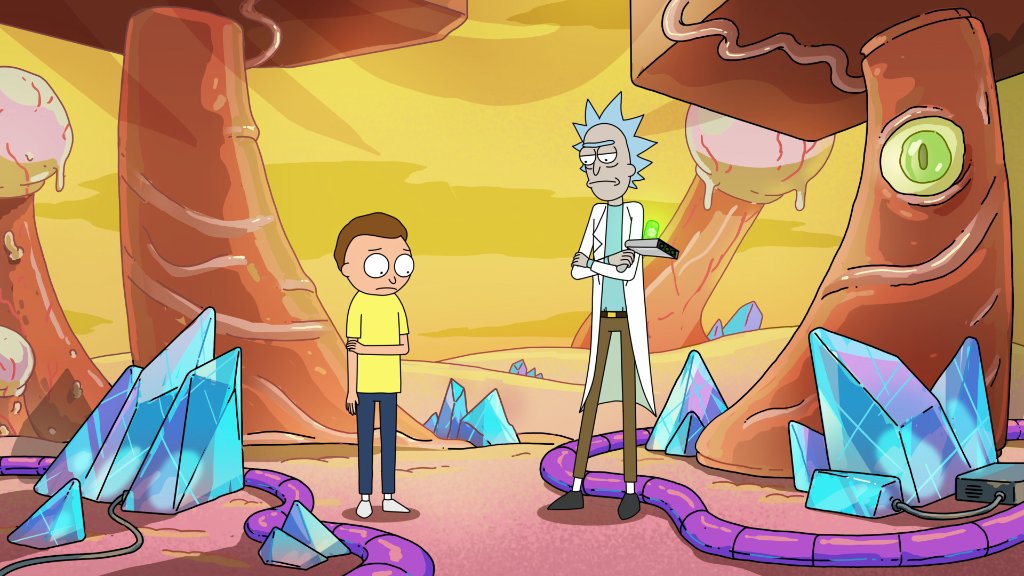When Rick Sanchez, a genius scientist from the Rick and Morty series, invents a robot, it asks about its purpose in life. You pass butter, Rick says indifferently. The robot, finding out the trivial role of its life, sulks at the futility of its existence. A sardonic Rick then says: “Yeah, welcome to the club pal.”
This certain brand of ‘absurdist humour’ is integral to the philosophy of Rick and Morty, an adult animated science fiction series from Adult Swim. The series revolves around a mad genius scientist Rick Sanchez and his grandson Morty Smith, who travel across the universe as well as an infinite number of alternate dimensions on bizarre adventures.
The series, which has earned universal acclaim for its take on various aspects of life, primarily focuses on the meaning and purpose of our existence, an idea that various philosophers, writers, and directors constantly explore in their works.
Shortly after the show was renewed for 70 episodes—a rare feat—Peter Libbey for the New York Times wrote: “It is dark, even to the point of being nihilistic; it is absurdist; and it operates less like a novel or serial drama and more like a meme or internet video.”
Just like the robot gag, the show focuses on the big question: the meaning of life.
For instance, in Rixty Minutes, Rick’s granddaughter realizes her life has no meaning as she was not born in alternate realities where her parents had achieved their dreams. Her decision to leave changes after Morty tells her that nobody belongs anywhere elucidating the point by how he had to bury his own alternate self in the backyard. It happened after he and Rick destroyed their world and shifted to the current one whose original Rick and Morty were dead.
Morty tells her: “Nobody exists on purpose. Nobody belongs anywhere. Everybody is going to die. Come watch TV.”
This quote is central to the ideas of Albert Camus, who proposed the notion of the Absurd. According to Camus, we tend to seek an inherent meaning of our existence in a meaningless and irrational world. Camus, however, says we must recognise this absurdity and embrace the meaninglessness. Once we do, he says, we are free to search for our own meaning and happiness. This can be as simple as watching the TV (as Morty tells Summer), spending time with kin and friends, or going on ludicrous life-threatening adventures.
The example stated above also points out how fragile and small life is. The ‘we are nothing but a speck of dust in this universe’ phrase is further exemplified as Rick constantly says Morty, Summer, and the lot are expendable as he can always find another version of them. In the Citadel of Ricks, various versions of Rick and Morty exist, where the former work as truck drivers, salesmen, doing menial labour, etcetera, highlighting how their roles as scientists are not absolute.
Another major example of this existential philosophy in the show is Mr Meeseeks, an alien being coming out of a box. They have a purpose in life: to fulfill one given objective before vanishing into oblivion.
In one episode, Mr. Meeseeks fails to help Jerry take off two strokes of his golf game. Now, devoid of fulfilling their purpose, they turn more like humans who have failed to achieve what they believe is their role in life, slowly becoming bewildered to take a wrong course of action in form of self-destruction, substance abuse, violence, or even suicide.
“Meeseeks are not born into this world fumbling for meaning, Jerry!....Existence is pain to a Meeseeks, Jerry. And we will do anything to alleviate that pain,” a Mr Meeseeks threatens Jerry, a naive human and dumb being, that acts as the opposite of Rick, a genius who has ‘seen it all’.
However, Jerry, who suffers greatly due to his stupidity, is happy with his life, while Rick, with all his knowledge, is an alcoholic, self-destructive human, whose life is miserable. He even tries to kill himself as opposed to his stoic nature but fails to go through it.
This points to the question: is knowing that life is meaningless better than remaining oblivious of the fact and being happy? Camus asks a similar question in the Myth of Sisyphus: “There is but one truly serious philosophical problem, and that is suicide.”
However, he says that suicide is not an answer. Similarly, the creators of the show, Dan Harmon and Justin Roiland, advocate the same thing.
In the episode Ricksy Business, Rick is seen cherishing time spent with Morty and Summer, enjoying the trivial task of cleaning their house together while goofing around.
Rick also changes his regularly-used catchphrase “Wubba Lubba Dub Dub” revealed to be “I am in great pain, please help me” in an alien language to “I love my grandkids”.
Joshua Schow, writes about Rick, for The Federalist: “In a cruel universe—rather, multi-verse—that has no ultimate meaning, the seemingly sociopathic Rick finds himself gradually expressing deeply human love.”
(Part 2 of the fourth season of Rick and Morty resumes Monday, May 4, on Adult Swim, in India)










